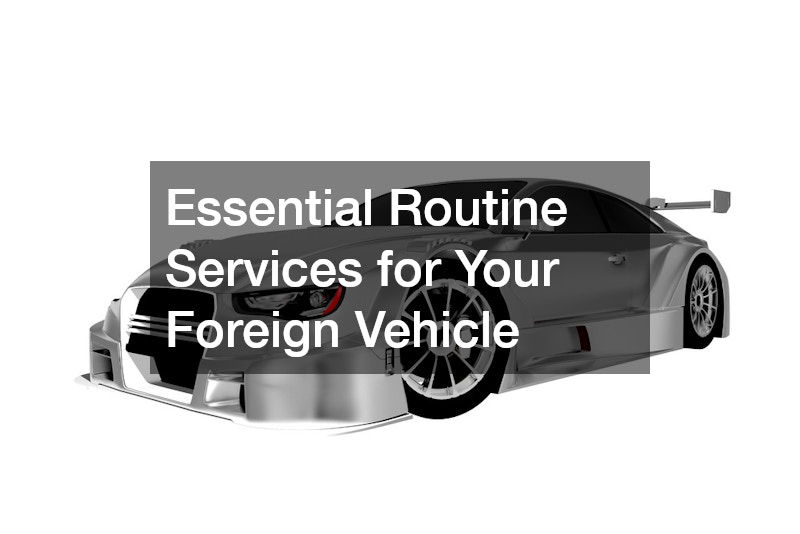Caring for a foreign vehicle—whether it’s a luxurious European sedan, a sleek Japanese sports coupe, or a stylish British convertible—can be an immensely rewarding experience. However, newcomers may find it intimidating at first due to unfamiliar brands, different parts availability, and specialized maintenance protocols. Foreign cars are often engineered with unique design philosophies, distinct mechanical layouts, and advanced technologies that set them apart from their domestic counterparts.
A major factor to keep in mind is that foreign vehicles often follow different service intervals recommended by their manufacturers. These guidelines are designed with the local environment and road conditions in mind. When you import a car from abroad, it may require more frequent maintenance or particular types of fluids, filters, or components. Additionally, some foreign vehicles have more complex electronics or specialized suspension systems that may demand expert attention. This is why finding a knowledgeable professional is crucial.
Fortunately, the modern automotive industry has become more globally connected, and today’s mechanics can often source parts and technical data for vehicles from various regions. Investing in proper care right from the start will allow you to enjoy the performance, style, and reliability that foreign automobiles are famous for. Whether you’re looking for routine inspections, cosmetic improvements, or more complex services, it all begins with understanding what makes your car unique and planning your maintenance strategy accordingly.
The Importance of Regular Maintenance and Inspections

One of the most significant differences you’ll notice when taking care of a foreign car is the strict adherence to maintenance schedules recommended by the manufacturer. Many foreign carmakers are known for their precision engineering, and they expect owners to stay on top of things like oil changes, coolant replacements, and brake fluid flushes. Ignoring these schedules or using subpar fluids and parts can negatively impact performance and reduce your car’s longevity.
Regular inspections go hand-in-hand with scheduled maintenance. Check for fluid leaks, odd noises, unusual vibrations, and dashboard warning lights. While these principles apply to all cars, foreign vehicles—especially those engineered with delicate tolerances—may be more sensitive to neglect. You should also pay attention to how the vehicle feels and responds. Even subtle changes can indicate early signs of trouble.
Adopting a preventative maintenance mindset will save you money in the long run. By addressing potential issues early, you avoid more extensive—and expensive—problems down the road. Whether you need standard auto services like a routine oil change or more comprehensive work such as car electrical repair, consistent attention ensures that your foreign vehicle maintains its peak condition and original performance characteristics.
Choosing the Right Auto Repair Professionals
When it comes to caring for a foreign vehicle, selecting the right mechanic or technician is one of the most critical steps. Not all service centers have the experience, equipment, or training to properly handle the intricacies of a foreign automobile. Look for an auto repair shop with a proven track record working on vehicles from your car’s country of origin. For example, if you own a German luxury car, consider a service center known for reliable BMW auto repair, ensuring technicians understand your vehicle’s complex engineering.
Another factor to consider is the availability of specialized diagnostic tools and manufacturer-specific software. Modern foreign vehicles rely heavily on electronic systems for engine management, infotainment, and safety features. Without the right equipment, even well-intentioned technicians may struggle to accurately diagnose and fix issues. Selecting a qualified, well-equipped mechanic will help you get the job done right the first time, saving you time and money.
Finally, when researching auto body repair companies or mechanics, ask about certifications, warranties, and references. High-quality service providers often offer guarantees on their work, use genuine parts, and are transparent with pricing. Building a relationship with a professional who understands your vehicle inside and out will help ensure a smooth ownership experience.
Essential Routine Services for Your Foreign Vehicle

There are a few fundamental services that form the cornerstone of maintaining a foreign vehicle. Oil changes, performed at the correct intervals, ensure that your engine’s internal components remain well-lubricated and free from contaminants. Likewise, periodic fluid changes—transmission fluid, coolant, brake fluid, and power steering fluid—keep all systems running smoothly.
Spark plugs, filters (air, oil, and cabin), and belts also require consistent attention. Replacing these items according to the manufacturer’s schedule ensures that your engine breathes clean air, ignites fuel efficiently, and avoids unexpected component failures. In some cases, your foreign car may have unique components not commonly found in domestic cars. Understanding when to replace them is essential for maintaining optimal performance.
Don’t forget to rotate and balance your tires regularly, ensuring even wear and good ride quality. Proper wheel alignments help maintain stable handling and prolong tire life. By diligently addressing these routine services, you will help your foreign automobile age gracefully, retain its resale value, and continue delivering the exceptional driving experience that drew you to it in the first place.
Specific Considerations for European Cars
European vehicles are renowned for their engineering prowess, precision handling, and robust safety systems. However, they may come with more complex electronic controls and sensors. These components require careful calibration and troubleshooting, making professional car electrical repair a necessity when issues arise.
When it comes to sourcing parts, you might find that authentic European components are pricier than their generic counterparts. Yet, investing in original parts often pays off in terms of reliability and performance. A well-versed technician familiar with European brands can guide you through the differences in parts quality and help you get the most out of your vehicle.
Owners of European vehicles should also consider local climate and driving conditions. Some models are tuned for performance at higher speeds on smooth roads and might need suspension or tire adjustments for different regions. You may need specialized fluids that match European specifications. By giving attention to these details, you can preserve the precise handling and comfort European marques are known for.
Tips for Handling Electrical and AC Systems in Foreign Cars
Foreign vehicles often come equipped with cutting-edge climate control and electrical systems. From sophisticated infotainment units to sensitive comfort modules, these electronics can be both a source of luxury and occasional frustration. If something goes wrong, it’s best to seek assistance from experts who understand foreign car electrical systems. Investing in professional car electrical repair ensures that your wiring, sensors, and modules are accurately diagnosed and restored to their full functionality.
Likewise, maintaining proper climate control is paramount, especially if you live in a region with extreme temperatures. The importance of timely auto ac repair cannot be overstated. A malfunctioning air conditioning system not only makes driving uncomfortable but can also indicate deeper issues within the car’s HVAC system. Skilled technicians can restore your vehicle’s climate control, so you can enjoy every journey regardless of the weather outside.
Regularly cleaning and checking the vehicle’s battery terminals, fuses, and wiring harnesses can prevent common electrical problems before they escalate. Understanding how these systems work and proactively caring for them will keep your foreign car’s electronics reliable for years.
Bodywork, Paint, and Dent Repairs for Imported Vehicles
Even the most meticulously maintained foreign car can sustain cosmetic damage. From minor scratches to more significant collisions, preserving your vehicle’s appearance requires expert attention. While you can try minor remedies at home, there is no substitute for a qualified technician who specializes in auto dent repair and paint restoration.
Consider working with a local auto body shop experienced in imported vehicles. These shops understand the nuances of matching paint colors formulated overseas and blending them seamlessly with existing finishes. When it comes to bodywork, some foreign models use unique materials or construction techniques that demand specialized knowledge. Skilled professionals know how to restore your car’s body to its original specifications without compromising structural integrity or aesthetics.
If more substantial repairs are needed, reputable auto body repair companies can handle everything from frame straightening to paintless dent removal. Don’t let minor cosmetic blemishes degrade your car’s value and appeal. With the right expertise, it’s possible to bring your foreign vehicle’s exterior back to showroom condition, ensuring it continues to turn heads wherever you go.
Maintaining the Drivetrain and Driveshaft in Foreign Cars
Your foreign vehicle’s drivetrain is the heart of its performance. Components like the transmission, differential, and driveshaft are engineered for smooth power delivery, responsive acceleration, and long-term durability. But these parts must be cared for properly. For instance, timely fluid changes are critical to keeping gearboxes and differentials lubricated and functioning optimally.
When you encounter vibrations, clunking noises, or difficulty shifting gears, it may be time to look into driveshaft services. A balanced and properly maintained driveshaft ensures stable power transfer to the wheels and minimizes wear on other drivetrain components. Just like other specialized aspects of foreign vehicles, maintaining these components may require the skilled hands of professionals who understand your car’s engineering intricacies.
In some cases, manufacturers design transmissions and drivetrains to be sealed units, making it challenging or impossible for inexperienced mechanics to service them. Ensuring you have a reputable specialist who can handle these unique systems will help keep your vehicle’s driving dynamics intact.
Long-Term Storage, Preservation, and Seasonal Care

If you plan on storing your foreign vehicle for an extended period—whether you’re traveling for months or protecting a seasonal ride—proper preparation is key. Start with a thorough cleaning, both inside and out, to remove dirt and contaminants. Consider applying a high-quality wax to preserve the paint finish. Ensure all necessary maintenance (oil change, fluid top-offs, tire pressure adjustments) is done before storage.
Preventative measures like using a battery tender, covering the vehicle with a breathable car cover, and keeping it in a climate-controlled environment will help safeguard against moisture, rust, and electrical drain. If you live in a region with harsh winters, taking these steps will keep your foreign car in prime condition, ready to be driven when the weather improves.
When you’re ready to bring it back on the road, perform a post-storage inspection. Check the condition of fluids, battery charge, and tire pressure. Start the engine gently, listening for unusual sounds. By carefully attending to long-term storage and seasonal care, you can ensure your foreign vehicle remains as pristine and reliable as the day you parked it.
Avoiding Common Mistakes and Misconceptions
Many beginners approach foreign vehicle care with preconceived notions. Some believe that foreign cars are inherently unreliable or expensive to maintain. While it’s true that specialized parts and services can cost more, good maintenance practices go a long way toward preventing major expenses. Familiarize yourself with your car’s manual, research its common issues, and connect with other owners who can share their experiences.
Another common mistake is relying solely on generic mechanics. While talented generalists exist, foreign cars often demand specialized attention. Attempting complicated jobs without the proper expertise may lead to misdiagnosis or further damage. For example, even something as seemingly straightforward as auto ac repair might require specific refrigerants or tools not commonly used on domestic vehicles.
Finally, avoid neglecting small signs of trouble. Strange noises, intermittent electrical issues, or minor oil leaks might be easy to ignore at first. However, proactive attention to these warnings can prevent more extensive problems down the road. Owning a foreign vehicle is a privilege that demands mindful stewardship. By understanding common pitfalls and their solutions, you’ll become a more confident and capable owner.
Cost Considerations and Finding Value in Quality Service
It’s no secret that foreign vehicle maintenance can sometimes be more expensive than standard domestic car care. Labor rates may be higher, parts might need to be shipped from overseas, and diagnostics can be more complex. However, focusing solely on cost can lead to poor decisions. Skimping on quality services or using non-genuine parts can compromise performance and safety.
Look for value rather than just the lowest price. A reputable auto repair shop may charge more upfront, but their expertise reduces the likelihood of repeat visits and additional repairs. Investing in skilled professionals who use top-notch parts ensures your foreign car remains in top shape for years. Over time, well-maintained vehicles retain their resale value better, offsetting initial maintenance costs.
Don’t hesitate to request estimates from multiple shops, particularly when you need more extensive services like car electrical repair or major engine work. By comparing prices, reputation, and warranties, you can find a balance between cost and quality. Remember, saving a few dollars in the short term is rarely worth sacrificing long-term reliability and enjoyment.
Developing a Long-Term Maintenance Plan

Planning ahead is essential for foreign vehicle ownership. Start by compiling your manufacturer’s recommended maintenance schedule, noting when major services and inspections are due. Include details like timing belt replacements, fluid flushes, brake overhauls, and transmission services. By having a roadmap, you can budget for upcoming expenses and avoid unpleasant financial surprises.
It’s also wise to identify and establish a relationship with a trusted local auto body shop and mechanics who understand your car’s needs. Keep detailed records of all maintenance and repairs. Should you ever decide to sell the vehicle, these records demonstrate that you’ve cared for it properly, likely increasing its market appeal.
Long-term planning isn’t just about following a schedule; it’s also about adapting to changing circumstances. As your car ages, certain components may need more frequent attention. Pay attention to trends in part availability, updates in recommended service procedures, and any recalls or technical bulletins from the manufacturer. A proactive approach ensures that you stay a step ahead of potential issues.
Common Upgrades and Modifications for Foreign Vehicles
Many foreign car enthusiasts enjoy personalizing or enhancing their vehicles. Whether you’re adding performance parts to a German sports sedan or customizing the suspension on a Japanese tuner car, it’s essential to proceed carefully. Research reputable brands known for quality and compatibility with your vehicle’s make and model.
When modifying electrical systems or upgrading infotainment equipment, seek expert advice. Some foreign cars come with intricate wiring harnesses and computer systems that can be disrupted by the wrong modifications. A trained technician familiar with car electrical repair can guide you toward safe, effective upgrades that don’t compromise reliability.
Likewise, cosmetic enhancements—such as body kits, wheel upgrades, and custom paintwork—benefit from a professional touch. Skilled artisans from auto body repair companies understand how to integrate new parts seamlessly. If you choose to go down the modification route, ensure you follow local regulations and remain mindful of long-term maintenance implications.
Working with Specialized Technicians and Shops
Finding the right professionals is central to caring for your foreign car. While generalist mechanics excel at day-to-day maintenance, specialized technicians bring deep knowledge and experience that can make a significant difference. They understand where to source parts, how to diagnose obscure issues, and how to maintain performance at factory specifications.
Look for shops that highlight their expertise in certain brands or regions. If you drive a European luxury car, a facility known for bmw auto repair might also handle other premium European marques. Similarly, if you have a passion for Japanese performance cars, look for specialists who know the ins and outs of that market.
Don’t overlook the importance of referrals and online reviews. Ask fellow enthusiasts, join online forums, and read testimonials. Identifying a reliable specialist before you encounter a major issue reduces stress and ensures you have a go-to resource for everything from routine oil changes to complicated car electrical repair tasks.
Considering Other Foreign Vehicles and Specialty Services
Foreign vehicle care isn’t limited to cars. If you own an imported van, truck, or even an RV from overseas, the principles of maintenance still apply. In fact, you might find it more challenging to find technicians who can repair rvs from specific foreign makes. The same careful research and planning required for cars apply to these larger and more complex vehicles. Seek out specialists familiar with your particular model, ensuring that everything from the engine to the living spaces remains functional and safe.
Additionally, certain foreign utility vehicles, off-roaders, and commercial transports may require unique preventative maintenance measures. Sticking to recommended service intervals, using approved fluids, and investing in quality replacement parts still holds true. By applying the lessons learned from car care to other imported vehicles, you’ll ensure a hassle-free ownership experience across your entire fleet.
Integrating Technology and Diagnostic Tools
Modern foreign vehicles heavily rely on onboard diagnostics and advanced software to manage everything from engine timing to driver assistance systems. Investing in a high-quality diagnostic scanner compatible with your car’s platform allows you to monitor critical data, clear fault codes, and understand when something needs expert attention.
While it’s not necessary for every owner to become a diagnostic expert, even a rudimentary understanding can help you communicate with your technician more effectively. By recognizing common error codes or performance anomalies, you can make informed decisions about when to seek professional help. This knowledge ultimately leads to more efficient and cost-effective care, as you avoid unnecessary exploratory work at the auto repair shop.
Moving forward, commit to a proactive mindset. Keep learning about your car’s needs, stay current with manufacturer guidelines, and remain open to expert advice. By doing so, you not only preserve the performance, reliability, and value of your foreign vehicle—you also cultivate a deep appreciation for the art and science behind its design.
Owning a foreign car is more than just transportation; it’s an experience enriched by culture, engineering heritage, and a passion for craftsmanship. Embrace your role as a caretaker, and enjoy the journey as you explore roads both familiar and foreign, confident that your car is in the best possible hands.
